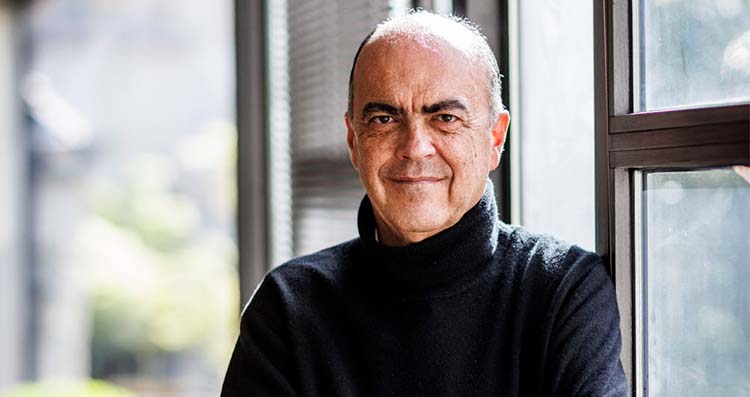Colon cancer: why employers are allies for awareness and screening
Eight deaths every day. That is the sad record of colon cancer in our country. Doctor Luc Colemont, with his organisation ‘Stop Colon Cancer' has been working to raise awareness of this silent disease for almost 15 years.
The gastrointestinal specialist sees employers as an important ally in early detection of colon cancer, especially as the disease is on the rise among those in their thirties and forties.

Who is Luc Colemont?
After a career of nearly three decades at Antwerp's Sint-Vincentius Hospital, gastrointestinal specialist Luc Colemont from Hasselt has been dedicating his heart and soul to colon cancer prevention since 2016. He is co-founder of the non-profit organisation Stop Colon Cancer. At home and abroad, he gives lectures to convince people to get screened.
25 diagnoses per day of a preventable disease
"Unimaginable that in our information society so many people still die of preventable disease," gastrointestinal specialist Luc Colemont begins his speech. The numbers are indeed hallucinatory. The risk of colon cancer is 5% in our country, so 1 in 20 Belgians will face it sooner or later. Every day there are 25 new diagnoses and eight patients lose the battle against the disease.
Furthermore, in recent years there has been a notable rise in colon cancer in people in their thirties and forties. Luc Colemont: "On the causes, science is in the dark for now, but eating habits and lack of exercise may play a role."
Higher number of early diagnoses since stool test
Fortunately, there is also good news to report: screening through the stool test is bearing fruit. Since the start of population screening 10 years ago, there are already 30% fewer cases of colon cancer in Flanders. Luc Colemont: "Moreover, participants have fewer diagnoses at the advanced stage of the disease, at 16% compared to 45% for non-participants."
Benign polyp becomes malignant tumour
Colon cancer almost always starts with a polyp in the wall of the colon. Such a benign tumour is initially not much bigger than a pinhead, but can grow into a malignant tumour after many years. Polyps produce no symptoms or complaints, except very minor bleeding. That blood cannot be seen with the naked eye in the stool, but is detectable through a stool test.
The stool test thus effectively ensures much earlier diagnosis and consequently higher survival rates. “Within cancer research, we distinguish 4 disease stages,” Luc Colemont explains. “In the first stage colon cancer has a cure rate of more than 90%, in the 4th and most advanced stage it is barely 15%.”
Investing more in awareness and information
So with the free population screening we are making health gains, although the bar in terms of participation rates needs to be much higher, according to Luc Colemont: "By 2022, in Flanders 48% of 50- to 74-year-olds participated, but in Wallonia and Brussels the participation rate is still far too low at 20% and 12% respectively."
“Why do only a minority of Belgians take part in the screening? Not so much because they are afraid of the results or possible follow-up tests, but because they still do not realise the importance of it. So our governments urgently need to invest even more in awareness and information about colon cancer, because it is a real silent killer."
"When I was still working in the hospital, I had to tell seven patients every month that they had colon cancer," he continues. "My big frustration was that people were always very surprised: 'how can that be, I'm living healthy, right?' Or: 'my blood has just been checked'. Or also: 'I'm not experiencing any problems'. I hope that with Stop Colon Cancer we can eliminate that ignorance, with employers as our allies."

Employers as allies for awareness raising
To help raise awareness and screen the target audience, the corporate world comes into the picture. Luc Colemont: "Employers are increasingly realising that their company's most important asset is the health of their employees. Many already organise medical check-ups for their employees, or a flu vaccination campaign. So why no colon cancer screening for those in their thirties and forties? In addition, they can also help promote population screening so that its participation rate goes up."
Some large Belgian employers already organise a stool test among their employees, and there are also examples of effective screening campaigns in our neighbouring countries.
Luc Colemont: "When screening within the work context, the participation rate is high, up to 80%. And that produces results. Because in every company of 100 employees, there are five who will face the disease sooner or later."
How Mensura actively raises awareness about colon cancer:
- We raise awareness of colon cancer among employees.
- We provide information on population screening in Flanders, Wallonia and Brussels.
- We set up campaigns to promote a healthy lifestyle among employees.
- We support an overall health policy.
Besides sensitisation and prevention, Mensura would like to play a more active role by being able to carry out the tests.
Your employees are your organisation's greatest asset. With a targeted health policy you measure your employee’s vitality and outline the right actions to promote their health.